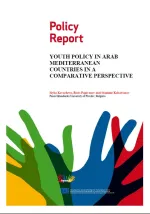Youth Policy in Arab Mediterranean Countries in a Comparative Perspective

SAHWA Policy Report nº. 6
This report is a review of the youth policy in five Arab Mediterranean countries (AMCs): Morocco, Algeria, Tunisia, Egypt and Lebanon. It builds upon two main sources of information: official policy documents and qualitative data from focus groups with stakeholders conducted by local teams under the framework of the SAHWA project funded by the 7th FP of the EC.
Based on desk research it examines the definitions of youth and youth policy, institutional structure, legal regulations, resource allocation and forms of young people’s involvement in policy making and implementation. Word cloud and thematic analyses provide a more in-depth look at the issues debated and positions taken by various groups of stakeholders in youth policy: policy makers, youth practitioners, managers in business associations and civil society organizations and young people in various locations throughout those countries. The report outlines common features of the youth policy in AMCs in which youth participation still remains a promise rather than a reality, the dominant image of youth is that of a problem and an expensive burden for society, strong centralization without much community and civil society engagement, the family as the main institution offering support for youth transitions, the emphasis placed on general education and sport while major social inequalities such as regional, gender and class disparities are not effectively addressed.